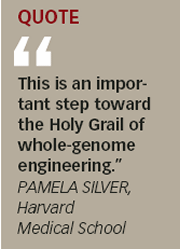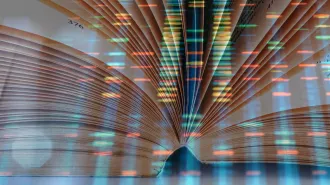In a step toward creating artificial microbes, scientists have managed to replace the entire genome of one kind of bacterium with the DNA of a related species. After the transplant, the recipient took on all the traits of the donor, effectively transforming into the donor’s species.

The researchers say they hope to use this new technique to swap a bacterium’s DNA for an artificial genome that they will assemble from scratch, thus creating the first synthetic life form. As well as helping scientists explore fundamental cell biology, such custom-made microbes could eventually be designed to produce biofuels and medicines efficiently, says study coauthor John I. Glass of the J. Craig Venter Institute in Rockville, Md.
“As you understand better how a cell works, it makes it possible to rationally design more-complicated [synthetic] organisms that meet some of the needs of humanity,” Glass says.
Implanting an artificial genome into a cell would be tricky, however, because DNA molecules longer than about 50,000 genetic units are prone to breaking. In the recent study, the ring-shaped DNA molecules from the donor bacteria were more than a million genetic units long. “You have to be very gentle,” Glass says. “Humpty Dumpty can’t be put back together again.”
The scientists gingerly extracted the DNA by first encasing a benign variety of Mycoplasma mycoides cells in a porous gel. With the donor cells cradled in this material, the researchers applied detergents and enzymes to dissolve all the components of the cells except their DNA. The scientists then moved the encased DNA into a solution containing the recipient cells, which belonged to the species Mycoplasma capricolum.
What happened next is still poorly understood. Somehow, about 1 cell out of every 150,000 took in the foreign DNA, displacing its own DNA in the process. Glass’ team added to the solution chemicals that are known to cause cells to merge and to make their membranes more fluid, but the scientists don’t yet understand how that change bacteria accomplished the DNA swap. The transplanted cells grew into colonies of bacteria identical to the donor bacteria, the team reports in the Aug. 3 Science.
“This is an important step toward the Holy Grail of whole-genome engineering,” comments Pamela Silver, a systems biologist at Harvard Medical School in Boston. However, the donor and recipient species used in the experiments belong to the same genus, which could mean that the cells are more compatible with each other’s genomes than they would be with a technique to build synthetic genome, notes Keith E. Tyo of the Massachusetts Institute of Technology.
Scientists can already create synthetic DNA molecules roughly 100,000 units long by piecing together a custom sequence of genetic units. In October 2006, J. Craig Venter, the study’s senior scientist and former head of the private effort to map the human genome, filed for a patent on a technique to build a synthetic genome based on a bacterium called Mycoplasma genitalium, which has a genome only 580,000 units long. Glass says that the team will soon be able to synthesize a single DNA molecule of that length.





